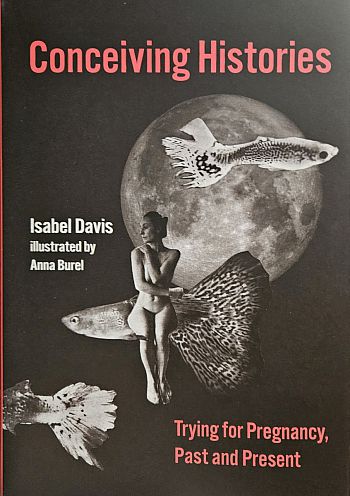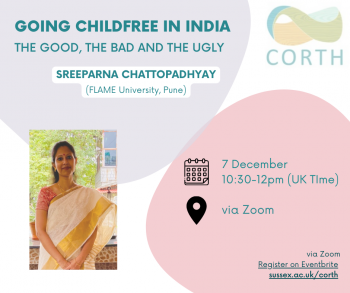CORTH's 10 Year Anniversary!
This year we celebrate the 10th anniversary of CORTH! The Centre was set up in the 2014-15 academic year and now - 10 years on - we reflect on the wonderful work and impact the Centre and everyone involved in its research have done. The CORTH Centre held a very successful day-long international workshop on the theme of ‘Reproductive Futures’ on the 13th of May to celebrate its 10th anniversary. The hybrid event saw many of its international members join to contribute their reflections and felicitations. The Keynote was delivered by Professor Marilyn Strathern from the University of Cambridge. The event also included the launch of a 5-year MOU between the University of Bergen, Norway and Sussex for research collaboration and knowledge exchange. University of Bergen representatives Professor Astrid Blystad and Emerita Professor Karen Marie Moland were greeted by Professor Sasha Roseneil (VC at Sussex) and Professor Rosie Cox (Faculty of Social Sciences Dean, Sussex). Visiting PhD student from Bergen Kaja Skoftedalan - shared her experiences of her fruitful stay at the Centre this term. In the morning session Prof. Shobhita Rajagopal (Former Professor, Institute of Development Studies Jaipur (IDSJ), India) and Ms. Chhaya Pachauli (Director, Prayas and National Co-convenor, People's Health Movement (PHM), India) shared their thoughts on the theme of “Reproductive Futures in India: Access, Choices and Challenges.” Innocent Grant (Youth co-Chair of the International Conference of Family Planning (ICFP2025), Tanzania) and Dr. Paula Baraitser (Medical Director, SH:24, UK) together discussed what contraceptive futures in Tanzania and the UK would look like. Dr. Devanik Saha (University of Greenwich, UK), Dr. Ulla McKnight (University of Sussex, UK) & Govind Singh (Institute of Development Studies, University of Sussex, UK) brought together their individual research experiences in India and the UK to highlight the “Lessons from discriminatory practices within sexual and reproductive health.” Prof. Silvia De Zordo (University of Barcelona, Spain) spoke on "(Non) Reproductive Futures: self-management, decriminalisation and demedicalisation of abortion." Our afternoon speakers Liiri Oja, PhD (Head of National Human Rights Activities Office of the Estonian Chancellor of Justice) shared her insights on "Sexual and Reproductive Rights in Estonian Prisons: Observations about Forced Gynaecological Examinations, Menstrual Health Rights and Obstetric Care.” Dr. Inga Winkler (University of Wageningen, Netherlands) offered her overview on “Critical menstrual studies: Reflections on the emergence and development of a field” and Dr. Jayna Kothari (Centre for Law and Policy Research, CLPR Bangalore and Supreme Court, India) shared her reflections on “Reproductive Futures in the Law.” The Keynote speaker for the workshop was the wonderful Prof. Marilyn Strathern (Girton College, Cambridge, UK) who delivered her thoughts on "Past and present where the future comes from."
You can read more about the workshop, speakers, Keynote and contributions from members in the Special Edition Annual Report, available at CORTH Annual Report 2025 (Digital Version)
Sussex anthropologist to play key role in groundbreaking fertility control research funded by Wellcome Trust
November 2025
The School of Global Studies is proud to announce that Maya Unnithan, Professor of Social and Medical Anthropology and Director of the Centre for Cultures of Reproduction, Technologies and Health (CORTH) is a partner in the pioneering research programme Contragestive Time, which has recently received a £3.85 million Wellcome Trust Discovery Award.
Wellcome Discovery Awards is a highly competitive scheme which provides funding for established researchers and teams who want to pursue bold and creative research ideas to deliver significant shifts in understanding related to human life, health, and wellbeing.
Contragestive Time: Pregnant Uncertainties in Fertility Control is a five-year project (2025–2030) exploring innovative approaches to fertility control. Led by Birkbeck, University of London, the project brings together collaborators from Sussex, University of Bristol, Manchester Metropolitan University, King’s College London, King’s College Hospital NHS Foundation Trust, the British Pregnancy Advisory Service, and Sexual Health:24. With the help of clinicians, social scientists, lawyers, philosophers, and advocates, the project explores the potential of contragestives, a new generation of fertility control methods designed for use during the crucial but overlooked window after ovulation and before early abortion is possible. Currently, women have no access to methods that could prevent pregnancy during this sensitive period. Maya and the team aim to understand why these options remain unavailable, investigating the legal, medical, social, cultural, and ethical barriers. Their goal is to identify what is needed to introduce contragestives safely, as new, effective choices for managing fertility beyond existing hormonal and procedural methods.
Professor Unnithan’s research explores the cultural politics of reproduction focusing on the social meanings and practices of bodily autonomy, reproductive subjectivities and health governance across India and the UK. Her work addresses issues such as infertility, contraception, assisted reproduction, surrogacy, abortion, and prenatal sex selection, with a strong emphasis on cultural ideas of reproductive justice, gender differences, and rights activism. As Director of CORTH, Maya also brings together interdisciplinary researchers working at the intersection of sexual reproductive health and emerging reproductive technologies, exploring the moral dimensions that shape social identities and wellbeing. Maya said: “As an anthropologist I have seen how gender politics, social inequalities and lived realities shape people’s ability to access contraception and exercise reproductive choice. Contragestives offer a promising new approach, and we look forward to exploring how our insight and expertise can help make these a reality for women.”
The project team is working with the public and policymakers to shape a more inclusive future for fertility control. Its mission is to expand our understanding of reproductive timing and lay the foundation for the next generation of fertility control.
Explore how Contragestive Time prepares the grounds for a contragestive future and read more about Maya’s research.
Dr. Chi Eziefula on BBC Radio 4 Podcast
August 2025
Dr. Chi Eziefula, Associate Professor in Infection at BSMS and CORTH co-Director, recently joined Chris and Xand van Tulleken as a guest on the What’s Up Docs podcast for BBC Radio 4 to discuss menstrual health - a subject she is deeply passionate about. The conversation explored how we can reframe menstruation positively, the importance of access to menstrual products and the role organisations can play in supporting healthier cyclical living. This builds on Chi’s Period Dignity and Athena Swan work, and comes ahead of her leading a menstrual product handout for new students during Fresher’s Week. Listen here https://www.bbc.co.uk/sounds/play/m002htv9
Global progress in abortion law reform: a comparative legal analysis since the International Conference on Population and Development (1994–2023) by Laurenne Ajayi
May 2025
Congratulations to CORTH member Laurenne Ajayi who, with colleagues from the Center for Reproductive Rights, published an article on Global progress in abortion law reform: a comparative legal analysis since the International Conference on Population and Development (1994–2023). The landmark International Conference on Population and Development took place in 1994. Since then, there has been an overwhelming trend towards liberalising abortion laws across all regions of the globe. Over 60 countries worldwide have liberalised their abortion laws. These liberalisations have resulted in approximately 825 million women of reproductive age living under expanded grounds for legal abortion than in 1994. During this time, only five countries have removed legal grounds for abortion or reduced the time limit for abortion on request. In total, these regressions impact 92 million women of reproductive age. The trend towards liberalisation marks a significant shift in the proportion of countries globally with restrictive abortion laws. There has been a significant movement away from the complete prohibition of abortion. More countries are permitting abortion on request. But such progress is not uniform and significant disparities continue to exist. 25% of women of reproductive age still live in countries that ban abortion altogether or narrowly permit it when the pregnant person’s life is at risk. This population is concentrated in Africa, Asia, and Latin.
Alongside the article, Laurenne has a podcast on the topic, which can be found at Global progress in abortion law reform since ICPD - Sexual and Reproductive Health Matters Podcast | Podcast on Spotify. The article can be read here Full article: Global progress in abortion law reform: a comparative legal analysis since the International Conference on Population and Development (1994–2023)
Laurenne is a CHASE-funded doctoral researcher in the School of Law, University of Sussex.
PERIODS: Human Rights in the Menstrual Movement
Spotlight on a project by CORTH members Dr. Inga Winkler and Dr. Janice Lazarus
Menstruation is not just a biological fact; it is a matter of rights, dignity, and justice. The PERIODS project explores how menstrual activism is redefining human rights in practice. It examines how stigma, silence, and restrictive norms can hinder access to healthcare, education, work, and full participation in society. The project aims to develop a deep and nuanced understanding of human rights in the menstrual movement by centring the experiences of those marginalised within mainstream menstruation discourses. It particularly focuses on young, translocal, global-South-driven movements advocating for menstrual rights. Through fieldwork, community voices, and critical scholarship, the project seeks to inspire more holistic ways of thinking about menstrual rights, human rights, and social justice.
Led by Dr. Inga Winkler, whose expertise spans public health, sexual and reproductive health, gender justice, and human rights, PERIODS adopts a grassroots approach. Drawing on lived realities and strategies from menstrual movements across diverse contexts, it brings together public health, gender justice, and human rights expertise. Professor Maya Unnithan (University of Sussex) serves on the advisory committee, contributing invaluable expertise on bodily autonomy, culture, and sexual and reproductive health and rights. Dr. Janice Lazarus is a postdoctoral researcher on this project. She holds a PhD in Gender and Sexuality Studies and brings research experience in sexual and reproductive health and rights, justice, and stigma.
PERIODS is funded by the European Research Council (ERC) and is based at Wageningen University and Research in the Netherlands.
Find out more: PERIODS: Human Rights in the Menstrual Movement - Wageningen University & Research
Welcome to Kaja Skoftedalen, CORTH's new Visiting Researcher
12th March 2025
A warm CORTH welcome to Kaja Skoftedalen who recently arrived at Sussex to join CORTH as our latest visiting researcher. Kaja is a PhD candidate at the Centre for International Health, Department of Global Public Health and Primary Care, University of Bergen. She has come to Sussex to study for a period with the CORTH Centre.
Kaja will be giving a talk on 'Exploring care in rituals of social reproduction in Southern Tanzania' on 8th April, where she will share some insights from her research.
Please join us in wishing her a warm welcome!
Conceiving Histories: Trying for Pregnancy, Past and Present - Book Release
6th March 2025
A huge congratulations to Isabel Davis whose book Conceiving Histories: Trying for Pregnancy, Past and Present (MIT Press) landed in bookshops on the 4th March!
A fascinating and beautifully illustrated account of trying to conceive in both the past and the present.
Inspired by the author's own experiences, Conceiving Histories brings together history, personal memoir, and illustration to investigate the culturally hidden experience of trying to conceive. In elegant, engaging prose, Isabel Davis explores the combination of myth, fantasy, science, and pseudo-science that the (un)reproductive body encounters in pursuit of a viable pregnancy. The book chronicles the trying-to-conceive lifecycle arc from sex education at school, through the desire to be a parent, into the specifics of trying and struggling to conceive. It also looks back at conception throughout history to open a new vista on what we live with today.
A central argument of Davis's is that historical people lived with the unknown just like we do but were more explicitly able to acknowledge it. In an age of assistive reproductive technologies, the act of embracing uncertainty seems difficult. Although the topic of not conceiving is potentially painful, this is not a grim book; more than grief, it is motivated by curiosity, wonder, compassion, and even humor. With 108 full-color illustrations by Anna Burel, Conceiving Histories is also a beautiful material object, an intentionally playful antidote and supplement to online search engines - the resort of so many embroiled in fertility challenges.
You can discover more about the book on the publisher's website: https://mitpress.mit.edu/9780262049481/conceiving-histories/. The book is produced by MIT Press and illustrated with 108 colour original illustrations by Anna Burel.

Citizen Science for Sustainable Menstrual Health
22nd January 2025
CORTH co-Director Dr. Chi Eziefula (Associate Professor in Infection, Brighton & Sussex Medical School) recently gave a talk at a workshop hosted by SSRP and CIRCY (two of the University of Sussex's ‘Centres of Excellence’) on sustainability research important to the lives of children and young people. The workshop, called Exploring environmental sustainability: what issues matter to the lives of children and young people? brought together young people and researchers with four presenters giving inputs on their research, and participants being invited to share their own ideas, responses, and questions. The event was a successful opportunity to collaborate on exploring complex sustainability issues where answers are not straightforward and contribute to an idea for a new sustainability game. Dr. Eziefula's presentation focused on "Citizen science for sustainable menstrual health."
CORTH Director, Maya Unnithan, awarded by Leverhulme Trust
15th January 2025
Professor Maya Unnithan has been awarded a Leverhulme Trust major research fellowship to explore the ethical, legal, and cultural dimensions of reproductive freedom, examining the right to reproduce and the right to avoid reproduction.
While philosophers and feminist scholars have long studied reproductive rights, anthropology has not yet fully explored how these rights are shaped by different social, moral and legal systems.
Maya's project, titled Reproductive Freedom and Ethics: A Comparative Study on the Making of Self, will investigate how reproductive decisions are influenced by religious, legal, and ethical frameworks in cultural contexts. By analysing case law in the UK, US, and India, as well as religious and ethical perspectives on reproductive freedom, she aims to better understand how reproductive aspirations are framed and navigated.
She said "I have worked for a long time on rights issues to do with the body, conception and contraception. Now I am really excited about exploring this through the idea of freedom which provides a broader moral and inclusive vision."
Reliance on fertility apps on rise in England and Wales, study shows
An article in The Guardian reports the potential risks associated with the move away from traditional hormonal contraception and use of fertility apps. Read the full article here.
International Day for the Elimination of Violence against Women (25 November 2024)
Statement by UNFPA Executive Director Dr. Natalia Kanem
Even as they flee crisis and disaster, women and girls have the right to safety and support
When conflict and disaster force women and girls to flee their communities and homes, they face grave danger. Displacement takes a devastating toll on their well-being and leaves them exposed to violence and abuse.
As livelihoods and safety nets vanish in emergencies, rates of gender-based violence can skyrocket. Shattered protection systems mean inadequate services and support, leaving many survivors struggling to recover on their own.
UNFPA is determined to end the scourge of gender-based violence, to protect women and girls, and to assist survivors on their journey to recovery.
As the lead United Nations agency for addressing gender-based violence in humanitarian settings, last year we provided services and protection from gender-based violence for 6 million people. We established 1,000 safe spaces offering comprehensive services, including legal aid and psychosocial support. And we are continually investing in long-term prevention strategies that address gender inequality and root causes that fuel cycles of violence.
This vital work provides hope and support when and where it is needed most. Together with our partners – including governments, civil society, and women-led organizations working at the grassroots level – we have saved and transformed countless lives. Still, the needs are staggering.
Every survivor of gender-based violence deserves protection, quality care, and access to justice. Yet, less than a quarter of the funding needs for essential prevention and protection services in emergencies have been met this year.
Along with more resources, there is also a need for strengthened laws and policies that protect women and girls in humanitarian settings and beyond. Men and boys also need to be engaged in interrupting patterns of violence and helping change harmful attitudes and gender norms.
As we mark this International Day for the Elimination of Violence against Women, let us renew our commitment to a world where every woman and girl can enjoy dignity and equality, living free from all forms of violence and harm.
It will take all of us to ensure that women and girls everywhere can navigate their futures safely and without fear. They must know that the world stands by their side, just as UNFPA does every day.

MOU with Bergen University
August 2024
CORTH and the Department of Anthropology at Sussex have just signed a Memorandum of Understanding (MOU) with Bergen University in Norway for collaborative research and knowledge exchange
This month we celebrate the approval of the MOU to ‘undertake collaborative research, training and knowledge exchange’ between our institutions over the next five years (2024-2029). The MOU has grown out of collaboration between the CORTH centre (UoS) and CIH centre (UiB) focused on the ongoing Maternal Mortality monitoring and surveillance ‘Matriset’ project (2021-2026; Norwegian Council funded) with junior (PhD level) and senior researchers visiting Sussex. The project includes PhD scholars, post docs and senior researchers from Tanzania, Ethiopia, Norway and UK. Going forward, several institutions from UiB would take part in this exchange, including the Depts., of Global Public Health and Primary Care, Centre for International Health (CIH), the Dept. of Health promotion and Development (HEMIL), with units on gender and development, and the Centre for Law Transform.
Going Childfree in India – The good, the bad and the ugly
By: Eve Wilcox
Last updated: Wednesday, 23 November 2022


